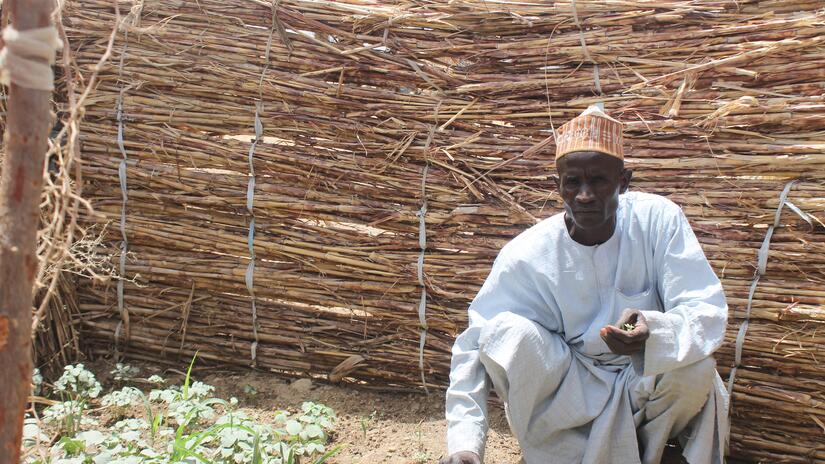By Mirabelle Enaka Kima, IFRC
The long-awaited day has finally arrived: The lives of internally displaced persons in communities settled at the Zamai camp, in the Far North region of Cameroon are changing for the better.
It was a sunny morning. The smiles on the faces of people at the Zamai IDP (Internally Displaced Persons) camp were already showing signs of their joy and excitement as Red Cross volunteers were getting set to start the distribution of farming aid and tools destined to support 150 people in farming activities.
Clad in a special attire, Sherif Moussari is one of the people who received the grant at the Zamai settlement hosting 2562 IDPs.
“I have been waiting for this day for a very long time. Farming has always been my passion and my only source of income to cater for my family. I have not been able to work as I used to do back in my village, and this has affected me and my household. We have never been used to begging from others but being in a foreign land, with no means, we have been living thanks to the generosity of well-wishers.”
Moussari hails from the Mayo Mouskota village in the Far north region of Cameroon. His village and many others along the border between Cameroon and Nigeria have, for the last few years, witnessed armed groups’ attacks, including kidnappings, killings, looting, burning of villages and theft of foodstuff. Moussari sought shelter at the Zamai camp two years ago, alongside his two wives and 12 children aged between two and 20.
To survive in his new host environment, Moussari has been working in people’s farms and keeping the livestock of those who need that kind of service. “I do not earn money for the work I do. I am being paid with foodstuff, which helps me to feed my family. Sometimes when I have much food, I take part of it to the market and retail to be able to buy oil and in some rare occasions I buy meat. For the livestock, my contractor has promised to give me one small ram for each ram that delivers. If he keeps his promise, I should be able, in a few years to come to have my own livestock and start my own animal farm. I just have to be patient and keep working hard,” says Moussari
A livelihood programme launched by the Cameroon Red Cross in three divisions of the affected Far North region, has mobilized 130 volunteers to support targeted families. These volunteers have been trained in farming and livestock techniques.
“At the Zamai camp, we have trained 15 volunteers who in return have extended the training to 150 people supported by the project. Each volunteer will have to follow up a group of 10 people as the latter shall start the farming activities. The volunteers shall assist the families in each of the stages of the farming process; from the reception and distribution of the farming inputs to the preparation of soils, the seeding and plowing, watering fertilization and phytosanitary treatment,” explains Ichaga Saidou, IFRC food security and livelihood supervisor.
Encouraged by Red Cross teams, most potential beneficiaries started a home garden as an experimental stage of the project and as a measure to test their level of commitment to carry out the agricultural project and be eligible to support.
The pilot stage of the project was a success for the Moussari family who, in addition to the home garden, has already identified a piece of land measuring 50 square metres to start commercial gardening. “I am confident that with the support we received we will be more resilient and fully integrated in our new host community,” adds Moussari.
“For 2019, as part of the project, there are plans to extend its actions to support river crops, in addition to commercial gardening and animal farm. However, the two major challenges faced by farmers remain the scarcity of arable land and limited access to water. Most of the land given to displaced families is arid and unproductive and the problem of drying water points is a general concern in the region,” concludes Saidou.
The ongoing project supported by the IFRC and the Swedish Red Cross intends to improve the livelihoods of 540 internally displaced persons and host communities in targeted Mora, Mokolo and Maroua localities through agriculture and livestock farming. The overall intervention is part of the lake Chad basin initiative to provide emergency assistance to vulnerable IDPs from armed conflicts who live in dire conditions in settlements and host families.

